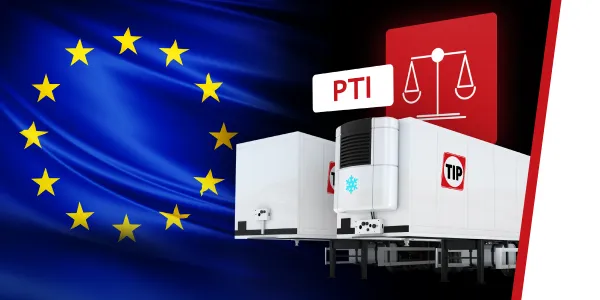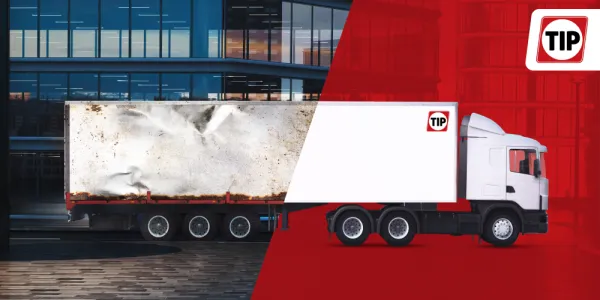Driving green: TIP Group’s roadmap to zero-emission mobility
“As TIP Group, we need to act as a catalyst,” says Arjen Kraaij, Deputy CEO of TIP Group. “In five years, we need to be able to proudly declare that we have spearheaded the introduction of zero-emission vehicles in our industry. That we’ve made these assets accessible to a broader audience.”
Following the release of TIP Group’s Sustainability Report 2022, we caught up with Kraaij for an in-depth discussion on the company's dedication to sustainability, and the innovative products paving the way for achieving their ambitious goals.
Balancing the environmental impact and economic significance of transportation is a complex challenge. How is your senior leadership team actively committed to driving positive change and mitigating the industry's contribution to climate change?
“There’s no two ways about it, the transportation industry significantly contributes to CO2 emissions. At the same time, it’s a fundamental part of the economy, both globally and especially in Europe. As a senior leadership team, we’re convinced that climate change is imminent, and we need to stay within certain limits to prevent severe consequences and leave the planet in a decent state for future generations. We believe that as a leader in leasing, rental, and maintenance of these assets, we need to step up and take charge. This belief is more than just a conviction; it's a deep-seated commitment within our senior leadership team.
You've emphasized your commitment to steering the industry toward greater sustainability. Can you outline the concrete steps TIP Group has taken to integrate responsible practices into your operations and decision-making processes?
“We began this journey right at our own doorstep. We established a dedicated ESG function and have an ESG Committee that includes both the CEO and members of the Executive Management Team to oversee our strategy. We've ramped up our internal controls and introduced new guidelines and policies. This isn't just about compliance or checking boxes; it's about weaving responsible conduct and ESG considerations into the very fabric of our decision-making process.
I’m proud to say that we have taken significant steps towards our goals, which have been recognized by external independent organizations. Sustainalytics recognized us as the leader in the transport industry with a 'negligible' ESG Risk Rating, while our EcoVadis score improved to 56 from 62 in 2023, placing us among the top 20% of companies worldwide. Our goal is, of course, to continue improve. The insights from EcoVadis give us a clear roadmap for this journey.
These ratings aren't just accolades; they're proof to our clients that we're not just talking the talk – we've got our act together and are fully equipped to help them make their own impact.”
How does TIP Group address these challenges for customers, and in which ways does the company support them in reaching their sustainability goals?
“For our customers, the primary motivation to switch to zero- and low-emission technologies is clear: to combat the direct effects of climate change. But let's face it, there are also several practical hurdles, like the still-developing charging infrastructure, the steep upfront cost of electric trucks, uncertainties about their residual value and maintenance costs, not to mention the price of electricity. At TIP Group, we're not just aware of these challenges – we're actively working to overcome them in close cooperation with our clients and partners.
There's a huge opportunity right now that extends beyond just truck engines; it also involves reefer trailers equipped with fossil fuel engines for cooling. The main challenge is that these diesel-powered cooling units aren’t meeting the low emission regulations required for new trucks. That's where e-reefer technology steps in as a game-changer. Fuel (diesel) powered cooling units can efficiently be replaced with electric engines, and that solution is available right now. This switch is an effective way to slash emissions across the industry in the short term, and it's an option we're making available to all our clients. We're not new to this tech; we've got ample experience and know firsthand it's a win-win solution from every angle.”

Beyond the electrification of the leasing and rental fleet, are there any other developments or initiatives in TIP Group's strategy?
“Data is another tool we can harness to not only cut down emissions but also boost efficiency. Within the next five years, we anticipate that at least 80% of our assets will be digitally connected, with all that data being aggregated on our TIP Insights platform. The key here is enabling our clients to harness the insights from this data to optimize their fleet operations more effectively. Minimizing maintenance and implementing proactive maintenance can drastically reduce unnecessary travel for servicing. This, in turn, leads to a significant reduction in emissions.
A beautiful example from the field is BrakePlus, our Electronic Braking Performance Monitoring System. It offers a smart solution for monitoring the braking system performance of your trailers and its analysis is accepted by the UK’s Driver and Vehicle Standards Agency. BrakePlus replaces the need to conduct physical roller brake tests throughout the year and is exactly the type of innovation we want our technology to unlock.”
What specific actions is the company taking in the next few years to turn these commitments into tangible results?
“Right now, there are countless ESG topics we've yet to touch on. We're working on narrowing the gender pay gap, pioneering Green Financing to secure more eco-friendly funding, transforming our workshops to be greener and more sustainable, and aim to refurbish over 5,300 trailers by 2025, among other initiatives. For those eager to dive deeper, I highly recommend our 2022 Sustainability Report.
As I mentioned earlier, our goal at TIP Group is to lead the change in introducing zero-emission vehicles in our sector. By 2030, we aim for 40-50% of our fleet to be composed of green, net-zero emission vehicles. This won’t just be limited to electric options; we're exploring a diverse array of solutions. Achieving this would represent a tremendous triumph in our sustainability efforts. More importantly, it would signal that we've successfully crafted an appealing business case, encouraging truck owners and fleet operators to adopt these zero- or low-emission technologies.”






